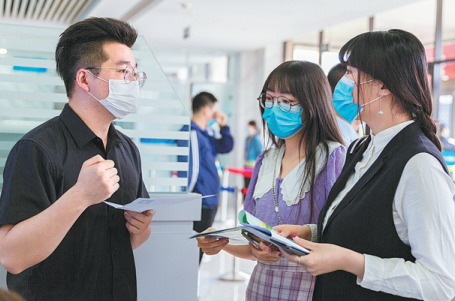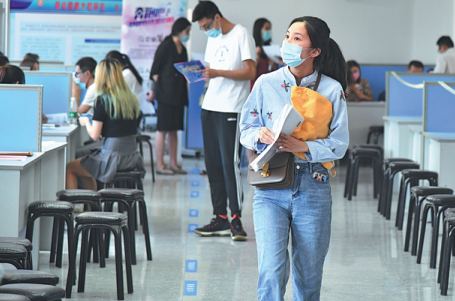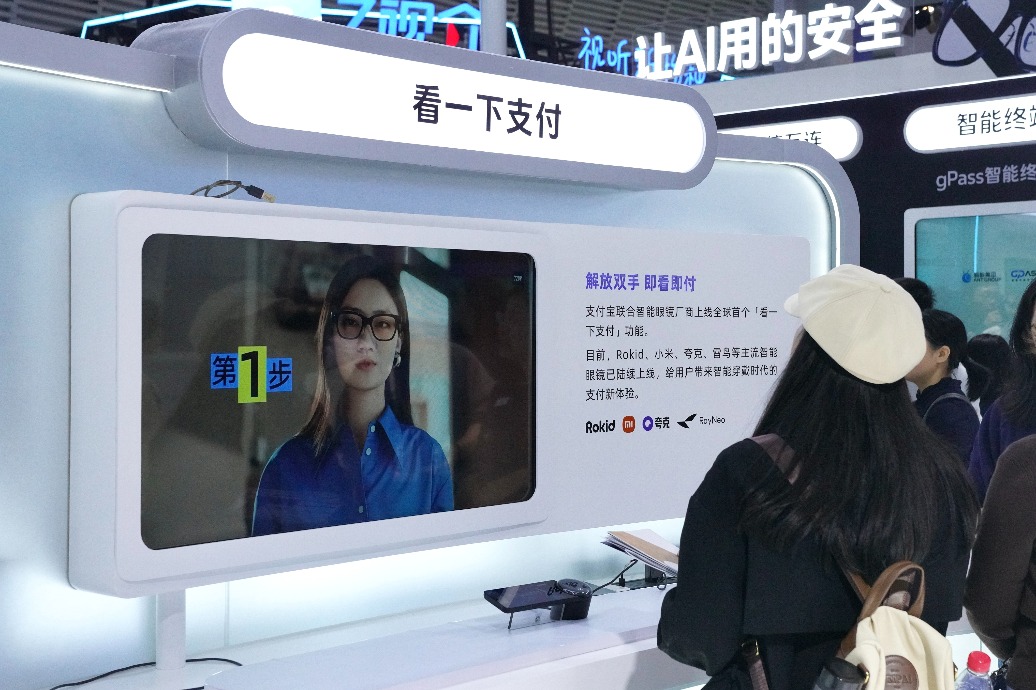Graduates set to realize their dreams
Initiatives will help boost job opportunities as employers and universities join forces, Xing Yi reports in Shanghai.

Graduation's lush green landscape of hope has been scorched by the blistering heat of reality. Dreams that seemed realistic and achievable just a few short months ago have been consigned to another world, to a time when the phrase "social distancing" had not entered the lexicon and people wearing face masks were few and far between.
"I've got zero offers this year."
"Me too."
"Have you all taken the entrance exam for graduate school?"
"I have, too."
This is an actual chat history from a WeChat group-the eighth job-seeking one-that Yang Anting, a college senior student, joined this year. Majoring in publishing at Beijing Institute of Graphic Communication, the 22-year-old has been looking for a job since the fall.
In the group, 488 college students set to graduate in July post information, ask questions and share their experience of how tough it is to secure a job.
Yang doesn't know them in person, but she checks these groups daily, grabbing every chance for something that might lead to an ideal job, while at the same time consoling herself that she's not alone.
The COVID-19 outbreak has brought many difficulties for graduates across the country hoping to find jobs. But help is at hand. Initiatives to boost the job market have been launched by the government.
In the past few months, Yang has applied for more than 200 jobs, taken more than 20 written tests and attended nine interviews, but hasn't found her ideal job yet.
She has received offers, but missed the opportunity to actually start a job due to the outbreak. Before the Spring Festival holiday, a company in Hangzhou, Zhejiang province, asked her to join them as soon as possible, but then COVID-19 hit.
"It didn't work out for me," Yang says, accepting her fate.
In July, around 8.74 million college students will graduate-a record number.
They will meet unprecedented challenges in finding a job-a slowing economy, a global pandemic and lasting trade tensions between the United States and China.
A report by BOSS Direct Employment, a Chinese online recruitment platform, showed that within 10 days after Spring Festival in early February, the number of new job offers had decreased by 49 percent compared to last year.
The demand for graduates to join small and micro-enterprises fell by 60 percent year-on-year, the report says.
"There are fewer choices, and lower salaries," Yang says, admitting that she had got another offer last year, but she didn't take it as the salary was just too low, but now she regrets it. "Had I known job hunting was going to be so tough this year, I wouldn't have turned the offer down."
Many universities have taken measures to help their students land a job, and many State-owned companies and public institutions have expanded recruitment.
At Beijing International Studies University, every one of the 2,000 graduates of the 2020 Class has a teacher assigned by the university who offers guidance and advice on finding work.
Zhao Shuguang, deputy general manager of the human resources department at China Telecom, was quoted in the media as saying the company will hire 11,000 college graduates, up 10 percent from last year.
Public service programs, especially at the grassroots level, have boosted hiring.
Sectors including agriculture production, primary education and basic medical services have also increased recruitment this year-hiring 32,000 people, 20 percent higher than last year, according to the Ministry of Human Resources and Social Security.
Graduates in Hubei province, the hardest hit by the pandemic, are finding it particularly challenging.
Of the 440,000 graduates in the province, 317,000 are from Wuhan, which emerged from the lockdown in April. For them, lockdown was a "pause" button on life.
Liu Xinyuan, a student of Wuhan University, says the impact of the COVID-19 on them was huge.
"During the lockdown, job hunting could only be done on the internet, including online written tests and interviews, but many of us had limited internet access," Liu says.
"Some students had to apply for jobs that don't match their majors. They had to accept jobs they normally wouldn't choose."
Colleges act
The Ministry of Education lent a helping hand by launching the "One Helps One" program, in which 48 universities in other provinces assist Hubei graduates.
With this program, universities have been paired and share information on job positions.
Peking University was designated to assist Wuhan University. Liu says Peking University has provided great support to his university by organizing many employment activities, including training and consultation, as well as internships and job references.
"For me, the greatest help is to provide timely and effective information. The job search information released by this official channel is very accurate," Liu says, adding that job information provided by universities are immediate and authoritative, and the interview training has also helped improve his skills.
While some graduates grab every chance they get, others choose to wait for what they want.
Duan Yinan, a graduate with a master's degree in international journalism from Renmin University of China, decided to turn down a job offer from an IT company. "Although it is difficult to find a job during the pandemic, I still think I should find one that I really like and am suitable for," Duan says.
Fearing that she would not find a job during the outbreak, Duan recalls that she blindly sent out her resume to many companies. However, when she received interview invitations, she often found that they were not the job she really wanted. Duan then decided to follow her heart and sent resumes only to the companies that she wanted to work for.
During the recent annual meeting of the National People's Congress, the word "employment" appeared 39 times in the Government Work Report, delivered by Premier Li Keqiang on May 22.
Li emphasized that stabilizing employment will be the government's priority, set the target of providing more than 9 million new urban jobs and will keep the urban unemployment rate at about 6 percent.
Many cities and provinces have already launched policies to boost employment.
The Shanghai government said State-owned companies will allocate no less than 50 percent of new positions for graduates.
Guangzhou, in Guangdong province, said it will provide 1.68 billion yuan ($237 million) of low-interest loans for startups.
Jiangxi province will give a 1,000 yuan subsidy to small and micro-sized companies for every college graduate hired.
In May, Duan got a position at the corporate culture department of a Chinese online education company. Liu has secured a job at a media company in Beijing, while Yang is still searching for a suitable job.
"There is no use looking back with a sigh, and I summon more courage to keep moving ahead," Yang says.
Gu Yuhan contributed to the story.



Today's Top News
- Crossing a milestone in the journey called Sinology
- China-Russia media forum held in Beijing
- Where mobility will drive China and the West
- HK community strongly supports Lai's conviction
- Japan paying high price for PM's rhetoric
- Japan's move to mislead public firmly opposed






























